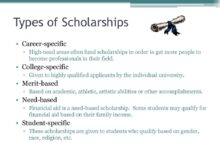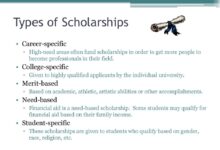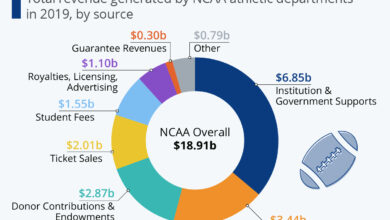Top Merit-Based Scholarships You Shouldnt Miss: Find The Best Scholarships Now
Top Merit-Based Scholarships You Shouldn’t Miss sets the stage for this enthralling narrative, offering readers a glimpse into a story that is rich in detail and brimming with originality from the outset. In a world where opportunities abound, these scholarships stand out as beacons of excellence and promise for deserving candidates seeking to further their education.
Creating a Healthy Meal Plan
Creating a healthy meal plan is essential for maintaining a balanced diet and ensuring you get all the nutrients your body needs. It can be especially important for vegetarians to plan their meals carefully to avoid any nutrient deficiencies. Here, we will provide a detailed weekly meal plan for a vegetarian diet, including breakfast, lunch, dinner, and snacks, to help you stay on track with your nutrition goals.
Weekly Meal Plan for a Vegetarian Diet
- Monday:
- Breakfast: Greek yogurt with berries and granola
- Lunch: Quinoa salad with roasted vegetables
- Dinner: Lentil curry with brown rice
- Snacks: Hummus with carrot sticks
- Tuesday:
- Breakfast: Avocado toast with cherry tomatoes
- Lunch: Chickpea and vegetable stir-fry
- Dinner: Stuffed bell peppers with quinoa and black beans
- Snacks: Mixed nuts
- Wednesday:
- Breakfast: Chia seed pudding with almond milk and fruit
- Lunch: Spinach and feta omelette
- Dinner: Vegetable curry with naan bread
- Snacks: Rice cakes with almond butter
Remember to include a variety of fruits, vegetables, whole grains, legumes, nuts, and seeds in your meals to ensure you are getting all the necessary nutrients.
Alternative Ingredients for Different Dietary Preferences
- Vegan: Substitute dairy products with plant-based alternatives like almond milk, tofu, or vegan cheese.
- Gluten-free: Use gluten-free grains like quinoa, rice, or buckwheat instead of wheat-based products.
Meal Prepping and Storage Tips
- Prep ingredients in advance, such as washing and chopping vegetables, to save time during the week.
- Store meals in portion-sized containers to grab and go for busy days.
- Utilize the freezer for batch cooking and storing meals for later consumption.
Consulting with a Nutritionist or Dietitian
It is always a good idea to consult with a nutritionist or dietitian before making significant changes to your diet, especially if you have specific dietary needs or restrictions. They can provide personalized recommendations and ensure you are meeting your nutritional requirements while following a vegetarian meal plan.
Understanding Eligibility Criteria
When applying for merit-based scholarships, it is crucial to understand the eligibility criteria set by each scholarship program. These criteria determine who can apply and receive the scholarship based on specific qualifications.
Comparison of Eligibility Criteria
There are different types of scholarships with varying eligibility criteria. For example, academic scholarships typically require high GPA or standardized test scores, while athletic scholarships may focus on physical fitness standards. Artistic scholarships, on the other hand, may require a portfolio showcasing the student’s talent and creativity.
Examples of Unique Eligibility Criteria
- Academic Scholarships: Specific GPA or test score requirements, such as a minimum GPA of 3.5 or a score of 1400 on the SAT.
- Athletic Scholarships: Physical fitness standards may include running a mile under a certain time or lifting a certain amount of weight.
- Artistic Scholarships: Portfolio requirements may vary, but could include a certain number of drawings, paintings, or other artistic pieces showcasing the student’s skills.
GPA and Test Score Requirements for Academic Scholarships
| Scholarship Type | GPA Requirement | Test Score Requirement |
|---|---|---|
| Merit Scholarship A | 3.8 | 1450 SAT |
| Merit Scholarship B | 3.5 | 1350 SAT |
Physical fitness standards for athletic scholarships may include running a mile in under 6 minutes or bench pressing 1.5 times the athlete’s body weight.
Portfolio Requirements for Artistic Scholarships
- 10 pieces of artwork, including drawings, paintings, and sculptures
- A written artist statement explaining the inspiration behind each piece
- Letters of recommendation from art teachers or mentors
Application Process for Merit-Based Scholarships
When applying for merit-based scholarships, there are several important steps to follow to increase your chances of success.
Researching Available Scholarships
- Start by researching different scholarships that you may be eligible for based on your academic achievements and other criteria.
- Make a list of scholarships that interest you and ensure you understand the requirements and deadlines for each.
Preparing a Standout Application
To stand out in your scholarship application, highlight your academic achievements, extracurricular activities, community involvement, leadership roles, and any unique skills or experiences.
- Provide specific examples of your accomplishments and how they have shaped your goals and aspirations.
- Showcase your passion and dedication by crafting a compelling personal statement or essay that reflects who you are and why you deserve the scholarship.
Meeting Deadlines
- It is crucial to meet all deadlines during the application process to ensure that your application is considered for review.
- Missing deadlines can result in missing out on valuable scholarship opportunities, so stay organized and plan ahead.
Requesting Letters of Recommendation and Transcripts
When requesting letters of recommendation and transcripts, choose individuals who know you well and can speak to your abilities and character.
- Provide them with all necessary information and deadlines to ensure they can submit their materials on time.
Maximizing Chances of Success
- Proofread all application materials carefully to avoid any errors or typos that could detract from your application.
- Follow formatting guidelines provided by each scholarship program to present a polished and professional application.
- Seek feedback from mentors, teachers, or advisors to improve your application before submission.
Essay Writing for Scholarship Applications
Writing a compelling essay is a crucial part of the scholarship application process. It provides an opportunity for students to showcase their unique qualities, experiences, and goals to the selection committee. Here are some tips on how to write an outstanding scholarship essay:
Crafting a Unique Essay Topic
When choosing a topic for your scholarship essay, consider highlighting a personal experience or a significant event that shaped your goals and aspirations. Reflect on your passions, achievements, challenges you’ve overcome, and how they have influenced your academic or career path. By sharing a genuine and heartfelt story, you can make your essay stand out and leave a lasting impression on the readers.
Importance of Personalization and Authenticity
It is essential to personalize your essay and make it authentic to your voice and experiences. Avoid using generic or cliché statements that do not reflect who you are as an individual. Be honest, vulnerable, and showcase your true self in your writing. The authenticity of your essay will resonate with the selection committee and help them connect with your story on a deeper level.
Examples of Successful Essay Topics
– Overcoming a personal challenge and how it has shaped your character and goals.
– Your passion for a specific field of study or career and why it drives you.
– A meaningful community service experience that has influenced your perspective on giving back.
– How a mentor or role model has inspired you to pursue your academic or professional aspirations.
– Your vision for making a positive impact on society and how receiving the scholarship will help you achieve that goal.
Remember, the key to writing a successful scholarship essay is to be genuine, passionate, and reflective in your writing. Showcasing your unique qualities and experiences will set you apart from other applicants and increase your chances of securing the scholarship.
Letters of Recommendation
Letters of recommendation play a crucial role in scholarship applications as they provide insight into the applicant’s character, achievements, and potential for success. They offer a different perspective beyond what the applicant themselves can provide.
Choosing the Right Individuals
When selecting individuals to write letters of recommendation, consider people who know you well and can speak to your academic abilities, work ethic, and personal qualities. Choose teachers, mentors, employers, or community leaders who can provide specific examples of your strengths.
Requesting Strong Letters of Recommendation
- Reach out to potential recommenders well in advance to give them time to write a thoughtful letter.
- Provide recommenders with your resume, academic achievements, and any specific points you would like them to highlight.
- Follow up with a polite reminder closer to the deadline to ensure they submit the letter on time.
- Express gratitude for their time and effort in writing the recommendation.
Interview Preparation
Preparing for a scholarship interview is crucial as it is often the final step in the selection process. Here are some key strategies and tips to help you excel in your scholarship interview.
Significance of Interviews
- Interviews provide a platform for the scholarship committee to get to know you beyond your application.
- It allows you to showcase your personality, passion, and determination.
Preparing for Scholarship Interviews
- Research the scholarship organization to understand their values and tailor your responses accordingly.
- Practice common interview questions and have clear, concise responses prepared.
- Work on your body language and communication skills to appear confident and professional.
Common Interview Questions
- “Tell us about yourself and your academic achievements.”
- “Why do you deserve this scholarship?”
- “How will you contribute to our organization if selected?”
Importance of Body Language and Communication Skills
- Maintain eye contact, sit up straight, and offer a firm handshake to convey confidence.
- Practice active listening and respond thoughtfully to questions.
Dressing Appropriately
- Choose professional attire that is appropriate for the interview setting.
- Avoid distracting accessories and opt for a clean, polished look.
Role of Mock Interviews
- Participating in mock interviews can help you gain confidence and refine your responses.
- Seek feedback from mentors or advisors to improve your interview skills.
Potential Academic Achievement Questions
- “Can you discuss a challenging academic project you completed?”
- “How have your academic achievements prepared you for future goals?”
- “What motivates you to excel academically?”
Strategies for Securing Merit-Based Scholarships
When it comes to securing merit-based scholarships, there are several strategies that can help increase your chances of success. It’s essential to showcase both academic excellence and extracurricular involvement to stand out in scholarship applications. Here are some effective strategies and creative ways to enhance your scholarship prospects:
Showcasing Academic Excellence and Extracurricular Involvement
- Highlight your academic achievements, such as high GPA, class rank, standardized test scores, and any honors or awards you have received.
- Demonstrate your commitment to extracurricular activities, leadership roles, community service, or special talents outside of academics.
- Connect your academic success with your extracurricular involvement to show a well-rounded profile and dedication to personal growth.
Examples of Creative Ways to Stand Out
- Create a compelling personal statement that reflects your unique experiences, goals, and aspirations.
- Showcase projects, research, or initiatives you have undertaken that demonstrate your passion and drive.
- Seek out niche scholarships that align with your specific interests, background, or career goals to increase your chances of success.
Resources for Finding Lesser-Known Scholarships
Finding lesser-known scholarships can be a great way to increase your chances of securing financial aid for your education. Here are some alternative resources where students can find these hidden gem scholarships:
Scholarship Search Engines
- Utilize specialized scholarship search engines like Fastweb, Scholarships.com, and Cappex to discover lesser-known scholarships tailored to your profile.
- Set up personalized alerts and profiles on these platforms to receive notifications about new scholarship opportunities that match your criteria.
Professional Organizations and Associations
- Explore scholarships offered by professional organizations and associations related to your field of study or extracurricular interests.
- These organizations often have scholarships with less competition as they are specific to a certain niche.
Community Foundations and Local Businesses
- Check with community foundations, local businesses, and non-profit organizations in your area for scholarship opportunities that may not be widely publicized.
- These scholarships are usually less competitive and have specific eligibility criteria based on your location or community involvement.
Remember, applying for lesser-known scholarships can increase your chances of winning financial aid as there may be fewer applicants competing for the same award.
Managing Multiple Scholarship Applications
Effective management of multiple scholarship applications is crucial to maximize your chances of securing funding for your education. Here are some tips to help you stay organized and meet various deadlines while prioritizing scholarship applications based on eligibility and requirements.
Strategies for Managing Multiple Scholarship Applications
- Create a spreadsheet or document to track deadlines, application requirements, and submission status for each scholarship.
- Set reminders and create a timeline to ensure you submit all required materials before the deadline.
- Prioritize scholarships based on eligibility criteria, award amount, and your chances of success.
- Allocate dedicated time each week to work on scholarship applications to avoid last-minute stress.
- Consider using templates for common application materials like essays and letters of recommendation to save time.
Scholarship Renewal Requirements
Maintaining eligibility for renewable scholarships is crucial for students to continue receiving financial assistance for their education. Here, we will explore the renewal requirements for merit-based scholarships, common reasons why students may lose their scholarship eligibility, and tips on how to stay eligible.
Renewal Requirements
Renewable scholarships typically have specific criteria that students must meet to continue receiving funding for each academic year. These requirements may include maintaining a certain GPA, completing a minimum number of credit hours, or participating in extracurricular activities.
- Students often need to maintain a minimum GPA, such as a 3.0 or higher, to renew their scholarship.
- Completing a set number of credit hours each semester or academic year is another common renewal requirement.
- Some scholarships may require students to participate in community service or other extracurricular activities to remain eligible.
Common Reasons for Loss of Eligibility
There are several reasons why students may lose their scholarship eligibility:
- Falling below the required GPA.
- Not completing the necessary credit hours.
- Failing to fulfill community service or extracurricular activity requirements.
- Violating the code of conduct or academic integrity policies of the institution.
Tips to Maintain Eligibility
To ensure you maintain eligibility for renewable scholarships, consider the following tips:
- Stay organized and keep track of the scholarship requirements and deadlines.
- Seek help from academic advisors or mentors if you are struggling academically.
- Get involved in extracurricular activities that align with the scholarship criteria.
- Communicate with scholarship providers if you encounter any difficulties meeting the requirements.
Impact of Merit-Based Scholarships on College Affordability
Merit-based scholarships play a crucial role in making college education more affordable for students. These scholarships are awarded based on academic achievement, talent, or other criteria, and can significantly reduce the overall cost of attending college.
Financial Benefits of Merit-Based Scholarships
Merit-based scholarships provide students with financial assistance that helps cover tuition, fees, and other educational expenses. According to statistics, students who receive merit-based scholarships often graduate with lower levels of student loan debt compared to those who do not receive such scholarships. This financial support can alleviate the burden of student loans and make higher education more accessible to a wider range of students.
Criteria and Selection Process
The criteria used for awarding merit-based scholarships vary depending on the scholarship program. Academic performance, extracurricular activities, leadership qualities, and community involvement are some common factors considered during the selection process. These criteria help identify deserving students who have demonstrated excellence in various areas.
Long-Term Effects on Academic Performance and Career Opportunities
Receiving merit-based scholarships can motivate students to excel academically and pursue their career goals with more confidence. The financial support provided by these scholarships allows students to focus on their studies without worrying about the financial burden of college education. Additionally, merit-based scholarships can enhance students’ resumes and increase their competitiveness in the job market.
Effectiveness of Merit-Based Scholarships vs. Need-Based Scholarships
While both merit-based and need-based scholarships play a vital role in addressing college affordability, merit-based scholarships are specifically awarded based on students’ achievements and potential. Need-based scholarships, on the other hand, are awarded to students based on their financial need. The effectiveness of each type of scholarship depends on individual circumstances and the availability of funds.
Role of Academic Institutions in Supporting Scholarship Programs
Academic institutions play a key role in promoting and supporting merit-based scholarship programs. By offering scholarships to talented students, colleges and universities can attract high-achieving individuals and create a more diverse and competitive student body. These scholarship programs also enhance the reputation of academic institutions and contribute to their overall success.
Drawbacks of Relying on Merit-Based Scholarships
While merit-based scholarships provide valuable financial support to students, there are some potential drawbacks associated with relying heavily on these scholarships for college funding. Some students may feel pressured to maintain high academic performance to retain their scholarships, which can be stressful and impact their overall well-being. Additionally, limited availability of merit-based scholarships can make it challenging for all deserving students to receive financial assistance.
Scholarship Scams and Red Flags
When searching for scholarships, it is crucial for students to be aware of potential scams that could jeopardize their financial security. Understanding common red flags and knowing how to protect oneself from fraudulent schemes is essential in the scholarship application process.
Identifying Red Flags
- Requests for payment: Legitimate scholarships do not require any payment to apply. Be cautious of scholarships asking for an application fee.
- Guaranteed winnings: If a scholarship claims guaranteed success or promises that you have won without even applying, it is likely a scam.
- Unsolicited offers: Be wary of unsolicited emails or messages offering scholarships, especially if they ask for personal information upfront.
Protecting Yourself
- Research the provider: Verify the legitimacy of the scholarship provider by checking their website, contact information, and reviews from other students.
- Trust your instincts: If something feels too good to be true or raises suspicions, trust your gut and investigate further before proceeding.
- Avoid sharing sensitive information: Never provide your social security number, bank account details, or other sensitive information to unknown sources.
Case Studies and Examples
One student shared their experience of a scholarship that required an upfront payment, only to disappear once the money was sent, highlighting the importance of due diligence.
Another student received an email claiming they had won a scholarship they never applied for, but upon investigation, it turned out to be a phishing scam.
Success Stories of Scholarship Recipients
Merit-based scholarships have the power to transform lives and create opportunities for deserving individuals. Here are some inspiring success stories of scholarship recipients who have achieved their academic and career goals:
Transformative Impact of Scholarships
Merit-based scholarships have enabled students to pursue higher education and unlock their full potential. By providing financial support, scholarships have lifted the burden of tuition fees and allowed recipients to focus on their studies and personal growth.
Criteria for Scholarship Selection
- Scholarship committees look for academic excellence, leadership skills, community involvement, and a strong commitment to personal and professional development.
- Committees also value diversity, unique experiences, and a compelling personal story that demonstrates resilience and determination.
Application Process and Tips
When applying for merit-based scholarships, it is crucial to meet all deadlines and submit required documents, such as academic transcripts, recommendation letters, and a well-written personal statement. To stand out in scholarship applications, showcase your leadership skills, community service, and academic achievements.
Importance of Personal Statement and Recommendations
A compelling personal statement is essential for demonstrating your goals, aspirations, and why you deserve the scholarship. When requesting letters of recommendation, choose individuals who can speak to your character, achievements, and potential for success.
Epilogue
In conclusion, Top Merit-Based Scholarships You Shouldn’t Miss encapsulates a world of possibilities for ambitious individuals striving to achieve their academic dreams. With dedication, perseverance, and the right resources, these scholarships can pave the way for a brighter future. Don’t miss out on the chance to secure your path to success with these prestigious opportunities.









